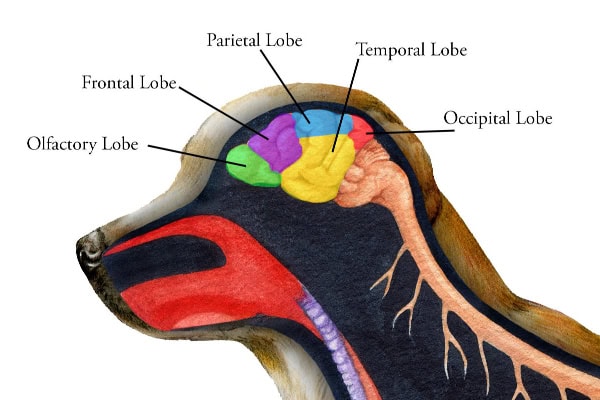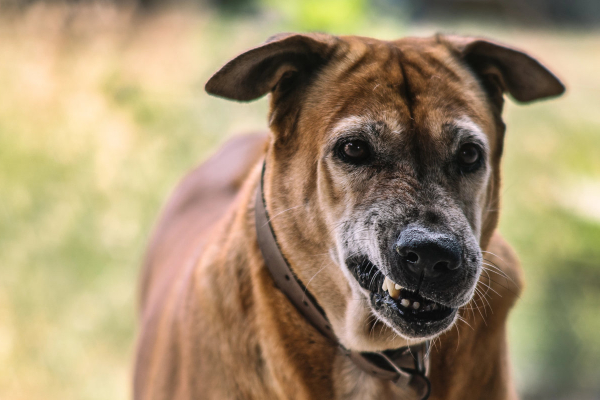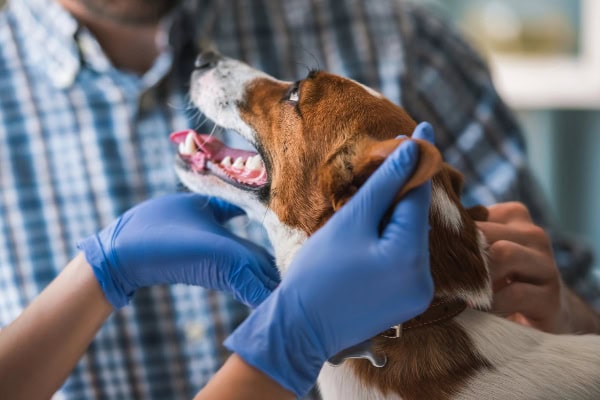Focal seizures in dogs only affect one portion of the brain, and can have a variety of symptoms ranging from facial twitching to excessive salivation or staring into space. Integrative veterinarian Dr. Julie Buzby explains the causes, symptoms, diagnosis, treatment, and prognosis for focal seizures so that dog parents know what to expect.

When you hear the term “seizure,” what comes to mind? Most likely, it’s the full-body convulsions that occur when dogs experience grand mal or generalized seizures. Generalized seizures as a result of idiopathic epilepsy are the most commonly recognized and described seizure type. However, other more subtle seizure events can also affect dogs of any age.
Another seizure type worth being aware of is focal (or partial) seizures in dogs. These events may often go unrecognized as seizure activity unless they become more frequent and severe or progress to generalized grand mal episodes.
What are focal seizures in dogs?
A focal seizure is abnormal brain activity in one area that causes repetitive movement of a dog’s body part and typically does not result in a loss of consciousness. It’s also known as a partial seizure since the affected dog does not experience full-body effects at the onset of the episode. In some cases, however, a focal seizure may progress to a generalized seizure.
As the names imply, a generalized seizure affects the entire brain (both hemispheres or halves) and results in physical symptoms that affect the entire body. These seizure episodes are typically “tonic-clonic.” In other words, dogs initially appear stiff and rigid (tonic) before transitioning to active, repetitive, jerky full-body movements (clonic). Dogs may also urinate, defecate, and lose consciousness during a generalized seizure.
Focal seizures affect one portion of the brain
On the other hand, focal seizures only result from abnormal electrical activity in one specific area of the brain. Symptoms of focal seizures can, therefore, vary widely based on the affected lobe or region of the brain.
Dogs with focal seizures most commonly have a distinct cerebral lesion. This means the abnormal electrical activity is only affecting one part of the cerebrum rather than both sides (hemispheres). The temporal lobe is the part of the brain most commonly affected. This lobe houses the limbic system, which oversees emotion, sensation, and memory.

The clinical signs of focal seizures reflect the specific areas of the brain that are affected. For example, a seizure originating in the hypothalamus may be more likely to cause abnormal behaviors like unprovoked aggression if the medial hypothalamus is involved. However, the dog may show repetitive chewing motions if the seizure affects the lateral hypothalamus.
What are the symptoms of focal seizures in dogs?
Focal seizures can take many forms. At first glance, they may simply look like strange behavior to a dog parent. The symptoms seen with focal seizures, fall into three main categories:
Motor focal seizures in dogs
During a motor seizure, the dog may exhibit rhythmic, repeated jerking of the head or another specific body part, repetitive blinking, facial twitching (eyelids, ears, or lips), snapping at the air (fly biting), and chewing motions with nothing in the mouth (chewing gum seizure).

Autonomic focal seizures in dogs
The autonomic nervous system controls automatic functions in the body. Thus, autonomic seizures may occur as a sudden onset of excessive salivation, spontaneous urination, or anal gland expression with no apparent trigger.
Behavioral focal seizures in dogs
Behavioral seizures can be more challenging for dog parents to identify and understand. Affected dogs may appear normal then begin staring blankly into space (stargazing) or become depressed, unresponsive, or suddenly aggressive with no provocation.
Focal seizures that turn into generalized seizures
In some cases, dogs may only have focal seizure symptoms. However, it is possible for a focal seizure to turn into a generalized seizure. In that case, the dog would move from having focal symptoms to more widespread stiffness, convulsions, loss of consciousness, and loss of bowel or bladder control.
What should you do if your dog is having a focal seizure?
If you do witness your dog having a focal seizure episode, keep these tips in mind:
- Don’t panic. If needed, take a few deep breaths to help you stay calm.
- Ensure your dog is in a safe space in case the episode progresses to a generalized seizure.
- Make note of your dog’s specific symptoms or behaviors and how long the episode lasts.
- Do NOT try to comfort your dog if he or she seems anxious or begins acting aggressive. This could lead to accidental injury for you and/or your dog.
- If you have a mobile device handy, record a short video clip to share with your veterinarian.
- Keep children and other pets in the home away from your dog until the episode has passed and he or she fully recovers.
- Write down your observations in a seizure journal once the event has ended.
After the first focal seizure event, reach out to your veterinarian. He or she can advise you about the next steps. Sometimes that is continued observation. Other times, the vet may want to see your dog promptly.

Are focal seizures in dogs dangerous?
Mild or short-lived focal seizures are distressing to watch but fairly harmless. However, focal seizures do have the potential to be dangerous if they progress into generalized seizures.
If the dog has a grand mal seizure that lasts longer than five minutes or multiple grand mal seizures back to back without fully regaining consciousness between them, this is status epilepticus, which is an emergency. Left untreated, status epilepticus can lead to brain damage or sometimes even death.
Also, keep in mind that having more than one focal seizure within 24 hours constitutes a cluster seizure event. If your dog experiences cluster seizures, no matter how short the individual episodes are, it is important to alert your veterinarian. He or she may recommend starting your dog on anti-epileptic medication at that point.
What causes focal seizures in dogs?
Focal seizures (whether or not they progress to generalized seizures) are typically due to structural abnormalities within the cerebrum. These structural changes can develop in puppies during development and be present at birth (congenital causes). Or they may occur at various stages of a dog’s life due to infection, inflammation, trauma, or tumor growth in the brain (acquired causes).
Additionally, certain dog breeds have a genetic predisposition to seizures that do not otherwise have an identifiable cause. These seizures fall under the category of idiopathic epilepsy.
Congenital causes of focal seizures in dogs
Congenital conditions that can cause focal seizures include hydrocephalus (water on the brain) and certain storage diseases that are present due to a lack of necessary enzymes.
Acquired causes of focal seizures in dogs
Acquired conditions that cause focal seizures include inflammatory processes such as granulomatous meningoencephalitis (GME in dogs), infections, scar tissue in the brain, hemorrhage, and head trauma.
Additionally, space-occupying lesions like cysts or brain tumors in dogs (which may be primary or metastatic) can also be the culprit. It’s worth noting that focal or generalized seizures may be the ONLY sign of a brain tumor in dogs. This is especially true in dogs with olfactory and frontal lobe tumors.
Stress or excitement can also trigger the onset of focal seizures. An example of this is seizures triggered by eating (STE), which are one of the least understood types of seizures in dogs. STEs start out as focal seizures. But they may evolve into generalized seizure episodes due to excitation at the onset of mealtime.
Idiopathic epilepsy as a cause of focal seizures in dogs
Idiopathic epilepsy, which is a hereditary predisposition to seizure activity, occurs in a variety of dog breeds. Some affected dog breeds tend to have generalized seizures. Others are more likely to have focal seizures, or may have a combination of seizure types. Breeds prone to focal seizures from epilepsy include:
- Australian and Belgian Shepherds
- Border Collies
- Cavalier King Charles and English Springer Spaniels
- Dalmations
- Finnish Spitz
- Lagotto Romagnolos
- Petit Basset Griffon Vendeen (PBGVs)
- Standard Poodles
- Vizslas

For more information about epilepsy in different dog breeds, check out the International Veterinary Epilepsy Task Force’s current understanding of idiopathic epilepsy of genetic or suspected genetic origin in purebred dogs.
How will the vet diagnose the cause of your dog’s focal seizures?
Focal seizures can be challenging to diagnose since they are either idiopathic (of unknown cause) or related to structural defects, injury, or disease in a specific area of the brain. Your veterinarian will likely recommend starting with a basic workup, including:
- Physical examination—The vet will look your dog over from nose to tail and perform a complete neurologic and ophthalmic (eye) examination.
- Lab work—Blood tests for dogs, including a CBC and chemistry panel, electrolytes, thyroid panel, and cortisol level, plus a urinalysis can provide a good baseline picture of your dog’s overall metabolic health.
- Blood titers and serologic testing (PCR)—The vet might recommend titers or serologic testing if he or she suspects an underlying inflammatory or infectious disease process.
- Imaging—If metabolic disease or cancer are on the differential diagnosis list, the vet may take X-rays of the chest (three views) and/or perform an ultrasound of the abdomen.
Depending on your dog’s baseline lab results, the next step might be more advanced diagnostic testing with a veterinary neurologist. Possible tests include magnetic resonance imaging (MRI) or cerebrospinal fluid (CSF) collection under sedation.

Plus, sometimes the neurologist may recommend an electroencephalogram (EEG). This can be a valuable tool for reaching an accurate diagnosis of focal seizures since it records subtle abnormal electrical activity in the brain. However, the dog would need to be having a focal seizure at the time of the EEG to pick up the seizure activity.
What is the treatment for focal seizures in dogs?
Your veterinarian or veterinary neurologist will use the information he or she collected during the diagnostic process to advise you about the safest course of treatment for your dog.
Sometimes a dog with focal seizures may not initially require anti-seizure medication. Or your dog may never require medication for that matter. For dogs with mild or infrequent seizure activity, the risks of starting on a daily medication may outweigh the benefits.
However, if your veterinarian does recommend medication to manage your dog’s seizure disorder, there are multiple good options available. The specific therapeutic protocol your veterinarian recommends will likely depend on several factors. One big consideration is any other comorbidities (medical conditions) your dog may have at the time of the seizure diagnosis. For example, some anticonvulsant medications should be used cautiously in cases of liver disease in dogs.
Anti-seizure medications
Phenobarbital is the most common first-line medication for controlling seizures in dogs. It usually has good efficacy overall, but does require regular bloodwork to ensure the phenobarbital levels stay in the therapeutic range. Plus, some dogs may develop a tolerance to phenobarbital with prolonged administration, resulting in breakthrough seizure activity.
If breakthrough seizures do occur, your veterinarian may recommend adjusting the dose of phenobarbital. Or he or she may add on a second anticonvulsant medication like potassium bromide.
Newer anticonvulsants like levetiracetam (Keppra) and zonisamide for dogs are also effective treatment options for focal seizures and those that progress to generalized events. The vet may use these medications on their own or in combination with other anti-seizure medications.
Note: If you notice any medication side effects or increased seizures please consult with your veterinarian. It is not a good idea to adjust your dog’s medication dosage or frequency yourself or to suddenly stop giving anticonvulsants.
Foods and supplements to improve brain health and potentially reduce seizures
Another option that can help manage focal seizures is adding an MCT oil supplement such as Dr. Buzby’s Brain Boost™ Organic MCT Oil for Dogs to your dog’s regular food. Research demonstrates that MCT oil for dogs can raise the seizure threshold for dogs with epilepsy. This means it takes more stimuli to cause a seizure, which may translate to a decrease in seizure frequency or severity. Additionally, MCT oil helps protect neurons and support overall brain health.
Alternatively, some dog parents may choose to start their dog on a veterinary prescription diet such as Purina Pro Plan® Neurocare™, Purina® Bright Mind, or Hill’s® Prescription Diet® b/d. All three foods contain omega-3 fatty acids for dogs (DHA and EPA), which promotes brain health. Plus, both Purina products contain MCT oil.
It is important, however, to realize that supplements and foods are intended to complement, not replace, anti-convulsant therapy.
Can you prevent focal seizures?
It is important to understand that nothing (even medication) is 100% effective in preventing seizures. The key is to be consistent and proactive in your dog’s care to minimize the potential for future episodes.

If your dog is on anti-seizure medication, give the dose(s) consistently each day according to your veterinarian’s instructions. Plus, if you do identify specific situations or triggers that evoke seizures in your dog, try to minimize or eliminate his or her exposure to them whenever possible.
What is the outlook for dogs with focal seizures?
The long-term prognosis for dogs who have focal seizure episodes depends on the underlying cause(s). Dogs with uncomplicated, infrequent focal seizures may achieve their normal life expectancy and maintain a good overall quality of life.
However, seizures due to a space-occupying lesion (cyst or tumor) in the brain carry a more guarded prognosis for long-term survival and overall quality of life. This is the case because there is a potential for the clinical signs to worsen as the mass grows.
Work with your veterinarian
If you’ve noticed strange symptoms or unusual behaviors in your dog and think he or she could be having focal seizures, please schedule an appointment with your veterinarian. If possible, bring a video of the episodes and your seizure journal. That information, plus some diagnostic testing, can help your vet figure out what is going on with your dog.
Understandably, receiving the diagnosis of a seizure disorder can be scary, regardless of your dog’s age. However, by being proactive with your dog’s care and keeping your veterinarian informed of any physical or behavioral health changes, you can help minimize future episodes and maintain the best possible quality of life for your beloved canine companion.
Has your dog experienced focal seizures?
Please comment below.


My almost 2 year old Australian cattle dog has had a few instances where he has what I think could have been seizures. He would start shaking and drooling a lot and unable to walk so I would hold him to make sure he didn’t fall over. They only last a few minutes and he is typically fine a few minutes later and able to walk. He stays conscious the whole time and responds and looks at us when he talk to him and say his name. I believe it all started happening after he got into some chemicals in my basement while my parents were watching him when I was on vacation last year. I came home to him falling over in the backyard. I have no idea what’s causing them.
Hi Casondra,
I am sorry your young dog is experiencing these seizure episodes. Toxins can definitely cause these types of issues, and it may be your boy is still having problems due to some permanent damage that was done. It would be a good idea to have your vet do a thorough evaluation and run some lab work to rule out the more common causes. As long as the seizures are mild and the frequency is low your boy may not need any treatment at this time. Your vet will be able to guide you through this process and offer advice along the way. Wishing you both all the best for many happy years ahead!
Hello, I have a pit mix that is approximately 4.5 years old. Can’t be sure because she is a rescue. In the 3.5 years I’ve owned her, she has had 2 seizures. At least I think they are seizures. From what I can gather they are focal seizures. The first time (about 9 months ago) I thought she had lost her eyesight because she stumbled, didn’t seem to see me or be able to focus on anything. I rushed her to the vet but when the doc saw her she seemed confident it was a seizure even though the onset was about an hour before I got to the vet and she was still showing those symptoms while I was there..
She had another one yesterday and the symptoms seemed the same, but maybe less intense and spanned over an hour.
I’ve moved since the first episode and called my new vet but they can’t see her for a couple of weeks. Was hoping a tech might be able to explain the duration as I’ve read sometimes the after effects are mistaken for the seizure but are just leftover effects. Anyway, they were unable to have a tech call me back.
I’ve read some articles stating that this type of seizure can last longer than normal but hoping you can better inform me. Thanks in advance. I’m very worried.
Dear Mike,
I am sorry your girl is experiencing these worrisome episodes. To be honest I am not sure what to make of them. They don’t sound typical of a focal seizure but that doesn’t mean they aren’t still some type of abnormal neurological activity. If there is any way you can catch this behavior on video it could be extremely helpful to your new vet as they try to get some answers. Hoping they can make a definitive diagnosis and ensure your girl remains happy and healthy for many years to come. Wishing you both all the best.
my male border collie 4 years old is on anti seizure medication he is classed as managed by my vet as his seizure frequency is less than once a month he first had general but his last one was focal , he also has small spoon full of MCT oil daily , not sure if this helps him but it certainly does no harm , due his blood test shortly ps his focal seizure was brought on by house visitors over excitement too much exercise and not having his usual nap.another PS no seizures since MCT oil but this does not prove anything. it’s hard work ,still learning.
Hi William,
I understand how hard it can be to watch a beloved pup struggling through seizures. It sounds like things are improving and I applaud you for continuing to pursue new ways to help your boy. MCT oil is a great idea and there are actually lots of research papers and scientific studies that have shown MCT oil can reduce seizure frequency and severity. Here is a link to another article with more information: MCT Oil for Dogs Can Help Dogs with Dementia or Epilepsy
Wishing you and your boy continued success and keep up the great work!
I just learned about focal seizures. While researching them, I came across videos which are very similar to what I have observed in my 12 month old St. Bernard, Curtiss. He recently began demonstrating unprovoked aggression, often after a stressful event, such as when the doorbell rings or strangers (to him) come in to my home. Due to his behavior, I’d been working with a trainer, but Curt bit the trainer three days ago. Curtiss has also been diagnosed with HOD. Is there any connection between brain lesions and HOD?
Hi Gina,
I am sorry you are in this difficult situation with Curtiss. I am not aware of any connections between brain lesions and HOD. But HOD is extremely painful, and pain can definitely trigger aggression. It sounds like you may need to pursue some additional testing or even ask about a consultation with a specialist. Hoping there is a solution for your sweet boy that will restore his quality of life and take away the risk of injury or harm to those around him. Feel free to leave an update and let us know how things are going.
I have some 4 weeks old puppys that r having sesurse an dying no baby’s live wen they r born wat can I do please help me I have raised dog all my life never had this to happen.they r pitbull an mountain cure
Dear Gator,
I am so sorry your puppies are suffering such tragic deaths. Without being able to examine them or knowing the mother’s medical history, it is impossible for me to offer the answers you are searching for. This could be due to a virus or other infection or even something genetic passed on from one of the parents. Please take any remaining puppies to your vet to be evaluated. Hoping there is a way to intervene and save a life. ♥
My daughter’s Lab had a mild seizure at age 2. His legs got stiff but he remained alert. This has continued to happen about once every 3 months. We took him to a neurologist and after watching the videos she diagnosed him with paroxysmal dyskinesia. In general it is harmless and some dogs grow out of it. It is still upsetting when it happens!! We have him on cbd oil but may try the mct. I am still suspicious that the Bravecto he was on could have caused this to happen.
Hi Dawn,
I am sorry your daughter’s Lab is living with this condition. But as you mentioned it is usually nonprogressive and doesn’t cause any detrimental effects. If you decide to try MCT oil I would be curious to know if it helps reduce the frequency or severity of the episodes. Wishing you all the best and thanks for sharing your experience with us!